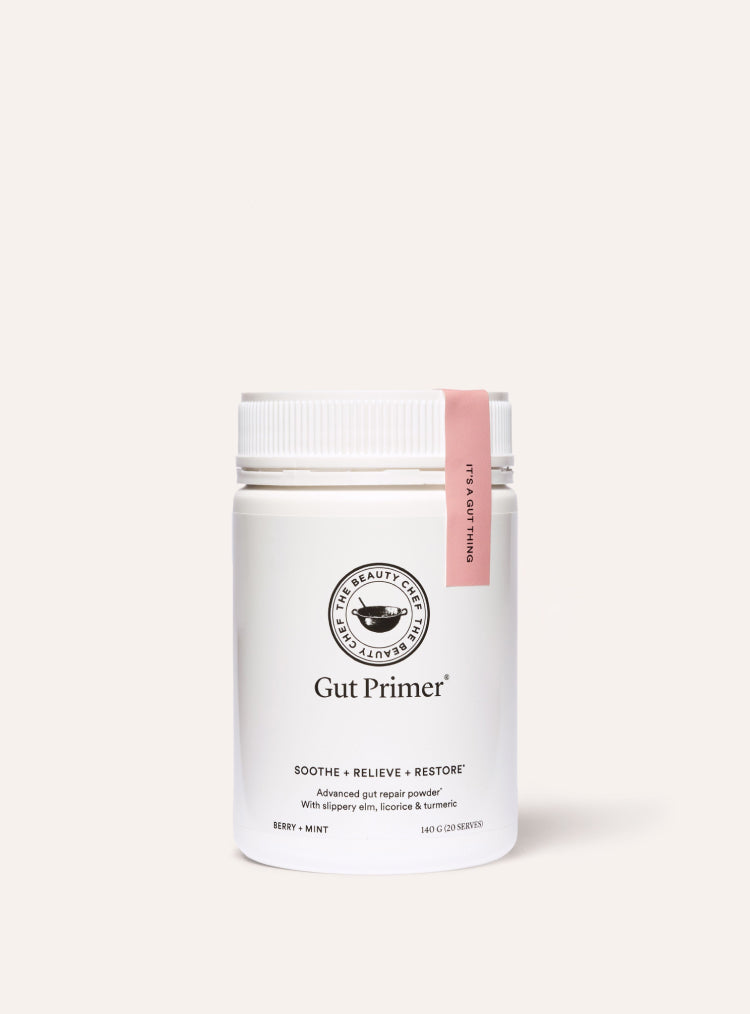
By Carla Oates
When it comes to our health, beauty and wellbeing, there are countless factors that can impact and influence how our body looks, feels and functions. And as we know—it all begins with the gut which is why the current trend towards an anti-inflammatory diet is worth paying attention to.
It’s also true that while there are many ways for us to take care of our gut, the most profound impact can certainly be made by what we decide to place on our plate. As I delve into in The Beauty Chef Gut Guide, “what we choose to eat can either help to heal our gut or harm it. Consuming refined sugars, MSG, alcohol, and charred or burnt food can all contribute to dysbiosis, toxin overload and inflammation.” And it’s this inflammation that can be particularly damaging—not only for our gut, but our overall health and wellbeing as well.
So, what is inflammation?
In simple terms, inflammation is the body’s immune system’s response to an irritant or threat and is essentially how it protects and heals itself from harm. In the case of acute inflammation—like when you scrape your knee or catch a virus—it’s our body’s inflammatory response that helps us to repair and heal. But ongoing or chronic inflammation can cause a variety of health conditions and chronic diseases including cholesterol issues, heart disease, cancer, type 2 diabetes, obesity and rheumatoid arthritis—as well as gut conditions like Crohn’s, leaky gut and ulcerative colitis. Not only that, but chronic or underlying inflammation can often go unnoticed inside the body without any overt symptoms—which is another reason why it’s so essential to help reduce overall inflammation in the body with lifestyle practices and dietary changes that limit its damaging effects.
What causes inflammation?
Unfortunately, there are many lifestyle factors that can play a role in inflammation—including lack of movement or regular exercise, not getting enough sleep, drinking too much alcohol, smoking, exposure to chemicals and toxins in our environment and, of course, our diet. While we all know that highly processed and packaged foods aren’t good for our health, other dietary factors like consuming too much refined or added sugar, eating lots of white flour, white breads or processed carbohydrates, saturated fats, fried foods , trans fats and vegetable oils, excess red meat intake and even too much gluten and/or dairy can trigger inflammation, for some people.
What are the basics of an anti-inflammatory diet?
An anti-inflammatory diet is very similar to the Mediterranean diet (which consists of lots of omega-3 fatty acids and healthy fats like olive oil, fatty fish like sardines or mackerel and avocado) and consists of an abundance of anti-inflammatory foods that are low-HI (human intervention) and full of nutrients, including:
- Antioxidant & Polyphenol-Rich Plants: Put simply, the more colourful the fruit or vegetable, the more health benefits it contains as more depth of colour means more antioxidants and polyphenols—which are beneficial plant compounds that research shows helps to improve gut health by promoting microbial balance. They also harbour prebiotic benefits, helping to encourage the production and proliferation of good bacteria and preventing the growth of harmful ones. Antioxidants are also key in terms of fighting inflammation as they scavenge free radicals—unstable compounds which damage cells and cause inflammation as well as ageing of the skin and body. Blueberries, dark leafy greens, red cabbage, green tea and even dark chocolate are all good examples of antioxidant and polyphenol-rich foods.
- Gut-healing Foods: Although not a food category in itself, the idea is that by healing and nourishing the gut first, we can temper any inflammation within our digestive system and subsequently support our body’s immune response. Gentle, gut-healing foods like bone broth, homemade chicken soup, gelatin gummies and gut-friendly spices like ginger, cinnamon (which also helps to balance blood sugar), turmeric and peppermint all boast anti-inflammatory properties, as does The Beauty Chef’s GUT PRIMER™ powder which is another simple way to help heal and soothe the gut.
- Fibre: We talk about fibre a lot at The Beauty Chef, but this is because it’s the best way to support our microbes and foster a healthy belly. Good sources include whole foods like fresh fruits, veggies, legumes, lentils, beans, nuts and seeds—where fibre acts both as an intestinal broom, sweeping through our intestines, and also as a prebiotic, feeding our good bacteria. One of the most commonly overlooked benefits of fibre, too, is its ability to produce short-chain fatty acids when it ferments in the large intestine. These anti-inflammatory compounds are so important for our health, strengthening and supporting our intestinal barrier, boosting immune function as well as brain and metabolic health.
- Fermented Foods: Not only do fermented foods form the cornerstone of everything we do at The Beauty Chef, but the probiotic benefits of fermented foods can help temper inflammation as fermented foods are already partially broken down, meaning they improve the bioavailability of nutrients in our food, making them more easily digested and absorbed by the body. They also bolster the diversity of bacteria in our gut, supporting gut wall integrity, immune health and reducing gut inflammation. Remarkably, more and more research is also showing the postbiotic benefits of fermented foods as these by-products of the fermentation process are proven to combat inflammation, reduce pathogenic bacteria and even modulate our immune function.






